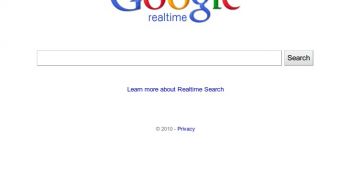Google has now moved its Realtime search to a dedicated location, separate from the "Updates" section of the regular search. The new emphasis comes with several new features like the ability to filter results by location as well as see all of the messages ion a conversation.
"Today we’re making our most significant enhancements to date, giving real-time information its own home and more powerful tools to help you find what you need," Dylan Casey, Product Manager at Google, wrote.
"Now you can access Google Realtime Search at its own address, www.google.com/realtime," he announced.
"On the new homepage you’ll find some great tools to help you refine and understand your results. First, you can use geographic refinements to find updates and news near you, or in a region you specify," he explained.
"In addition, we’ve added a conversations view, making it easy to follow a discussion on the real-time web," he added.
One of the biggest requests, by those that regularly used Google's real-time search feature, was for it to get its own homepage. So far, the real-time search feature only showed up automatically if the search engine deemed it relevant to the query. Users could also access it from the Updates section in the left sidebar.
Now they can visit the new homepage and get real-time results straight away. Along with a new home, the search engine also got a few new features. One of the biggest is the possibility to filter results by location.
This adds a new dimension to the real-time search results as it enables users to narrow down the results to the places their interested in. Of course, the messages have to have some sort of location meta-data attached to them for this to work. Twitter has had a geo-location feature for almost a year now, but geo-tagged tweets still aren't commonplace.
Another very useful new feature is the "conversations view" which, as the name implies, allows users to see the tweet or status update in context, along with retweets, replies, comments and so on.
Finally, you can set up Google Alerts to notify you of when a topic you're interested in pops up in conversations. You will receive an email every time this happens, but you can also choose to be notified once per day or once per week. Of course, an email once a week is not exactly real-time anymore.

 14 DAY TRIAL //
14 DAY TRIAL //